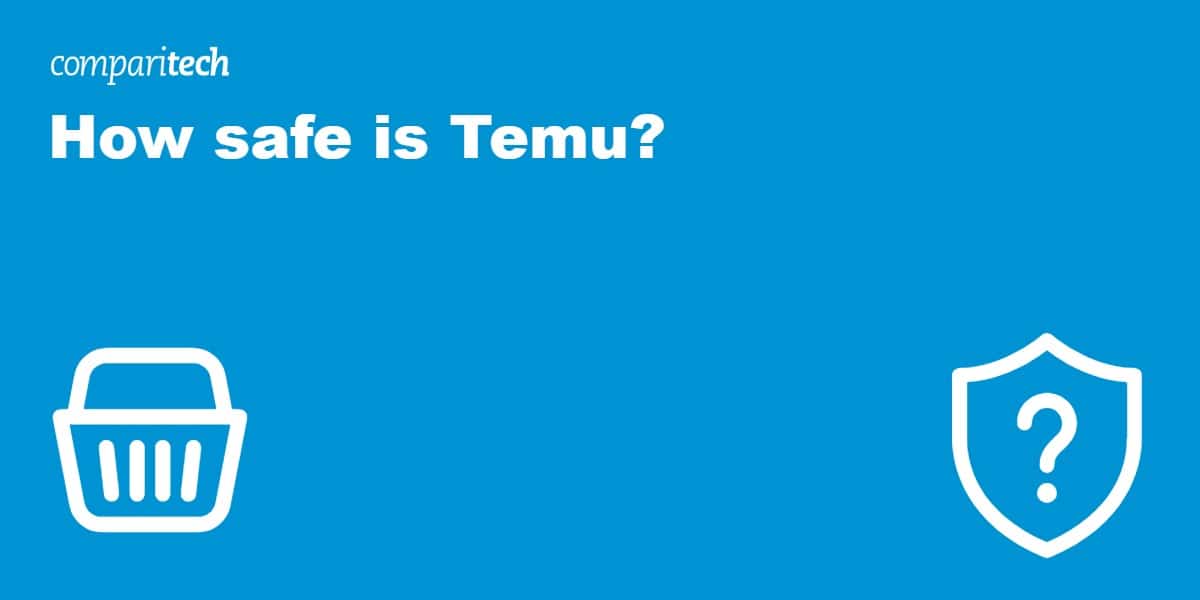With its low prices and relentless marketing, Temu has become a major force in e-commerce. But while we all love a bargain, should we be paying more attention to how the platform operates?
In this article, we look at how safe Temu is, and whether or not you should trust it with your personal details or payment information.
How does Temu work?
Temu acts as a marketplace for third-party sellers from China. It taps into an existing network of manufacturers established by its parent company, PDD Holdings (formerly Pinduoduo), a well-established Chinese e-commerce company.
Temu’s goods ship directly from Chinese factories or warehouses, removing the need for physical storefronts. Cheaper production costs in China help drive prices down further, as does a willingness to abandon manufacturers who don’t play ball price-wise. Even with these advantages, Temu’s prices are too low to be profitable.
Rather than trying to turn a profit, Temu is more interested in positioning itself as the go-to provider for online shoppers—even if that means losing money in the process. According to one estimate, Temu is losing between $588 million and $954 million per year. Others suggest that Temu loses roughly $30 on each order.
Why is it so popular?
Despite advertising instructing users to “shop like a billionaire,” Temu’s raison d’etre is low-cost goods—everything from clothes to consumer electronics. Given the economic stresses consumers in the UK, US, and elsewhere currently face, the repeated promise of bargain basement prices has proved overwhelmingly tempting.
Temu launched in the US in September 2022. A few months later, it was the most downloaded free app on the App Store and Google Play. By January 2024, it had 19 million average monthly searches on Google and hit $1 billion monthly gross merchandise value.
The platform’s meteoric rise has relied on a multi-pronged marketing strategy, most recently seeing it pay for six 30-second commercials during the February 2024 Super Bowl. These ads were effective and resulted in a 25% increase in visitors on the day of the Super Bowl compared with the previous Sunday.
In addition to the Super Bowl ads (which cost an estimated $7 million a pop), Temu has invested significantly in ensuring its ads appear prominently in search results and on platforms such as Facebook and Instagram.
According to retail analyst Neil Saunders, Temu’s other strategy relies on “persuading influencers to push products and to suggest buying things on the platform via social channels like TikTok and YouTube.” Non-influencers, too, have been cajoled into promoting Temu with promises of free products in return for promoting social media platforms or getting friends and family to sign up.
The most recent Temu scheme has proved to be particularly controversial due to its significant implications for user privacy.
The Temu cash giveaway
In March 2024, social media users began sharing a “free cash giveaway” from Temu en masse. The scheme required people to send out invitation codes inviting other people to download the Temu app. In return, the person who shared the invite and the person who used the link to download the app would receive $63 in their PayPal accounts.
Perhaps unsurprisingly, it wasn’t quite this easy. The details were in the small print, which – among other things – stated that Temu could cancel the whole thing at any point or substitute cash for something else, like a Temu credit, without warning.
Furthermore, by taking part in the scheme, users agreed to give away personal information that Temu can use indefinitely. The Rules stated those who participated in the program automatically consented for Temu to use and publish their “photo, name, likeness, voice, opinions, statements, biographical information, and/or hometown and state for promotional or advertising purposes in any media worldwide, now known or hereafter developed, in perpetuity without further review, notification, payment, or consideration.”
Many users rightly questioned whether giving Temu permission to use all of this data – however and whenever it wanted – was worth $63 (or some Temu credits). Opinions on the matter differed.
Some people made an objective decision to sign up, but the majority of users most likely joined in without reading the fine print. A combination of the fear of missing out, financial need, and the game-like aesthetic of the offer generated an emotional response resulting in action rather than calculated thought. It’s a technique used by shopping sites (and scammers) the world over.
Related: The best identity theft protection services
User privacy
Temu’s “cash giveaway” offer isn’t the first time the company—and its owners—have had their privacy policies questioned.
In March 2023, Google suspended PDD Holdings’s Pinduoduo e-commerce app after versions of it were found to contain malware. Malicious instances of the Pinduoduo app exploited a zero-day vulnerability in Android that allowed it to steal personal data and install malware on compromised devices.
The US government subsequently warned users of potential data risks when buying from Temu. Later that year, a class action lawsuit was filed against Temu, alleging that the company collected more data than was necessary and in a greater amount than publicly disclosed.
The lawsuit quoted experts who alleged that Temu “purposefully and intentionally” loaded tools into its app that “execute virulent and dangerous malware and spyware activities on user devices”.
Temu disputed the claims, pointing out that the quoted experts were sourced from a report generated by a short-selling firm and thus biased.
That report was produced by Grizzly Research, which lists some questionable features of the Temu app based on its analysis. These include system logs being requested from “/system/bin/logcat” and users’ MAC addresses being put into a JSON file to be sent externally. It also claims that the app has “a stealthy method” of getting compiled code onto the user’s system at runtime that “has not been seen by any security detection scans”.
While the Grizzly Research report makes for damning reading, it’s difficult to trust a company dedicated to sending other companies’ share-price spiraling.
More independent-minded experts suggest the risks of the Temu app aren’t as pronounced. According to the chief information security officer at cybersecurity firm Acronis, the Temu app, which requests 24 permissions, isn’t as “aggressive” as the Pinduoduo app, which requests as many as 83 permissions.
Other controversies
Beyond its data practices, Temu faces accusations of forced labor and contributing to environmental degradation. A US government investigation warned of an “extremely high risk that Temu’s supply chains are contaminated with forced labor”, while in France, legislators have approved a law banning the advertising of ultra-fast-fashion companies like Temu.
How to delete your Temu account
If the above has made you think twice about continuing with Temu, you’ll be glad to know that it’s easy to delete your Temu account. Just do the following:
In the app:
- Login to your account and tap your avatar.
- Tap “Settings”.
- Tap “Account Security”.
- Tap “Delete your Temu account”.
- Tap “Delete” again to confirm.
Via the website:
- Login to your account and tap your avatar.
- Click “Account Security”.
- Click “Delete your Temu account” at the bottom of the screen.
- Click “Delete” again to confirm.








